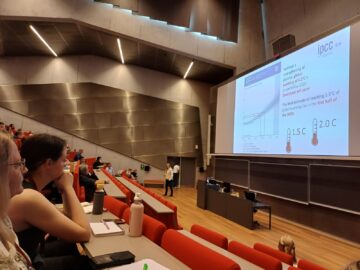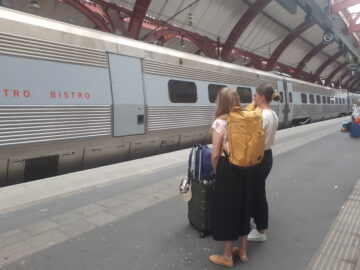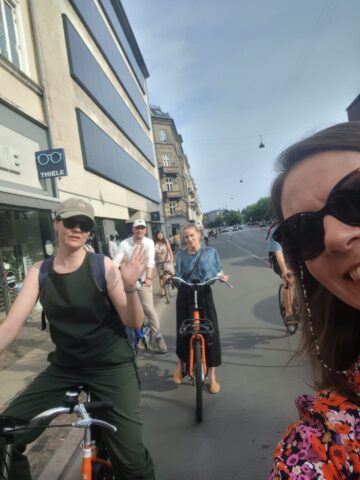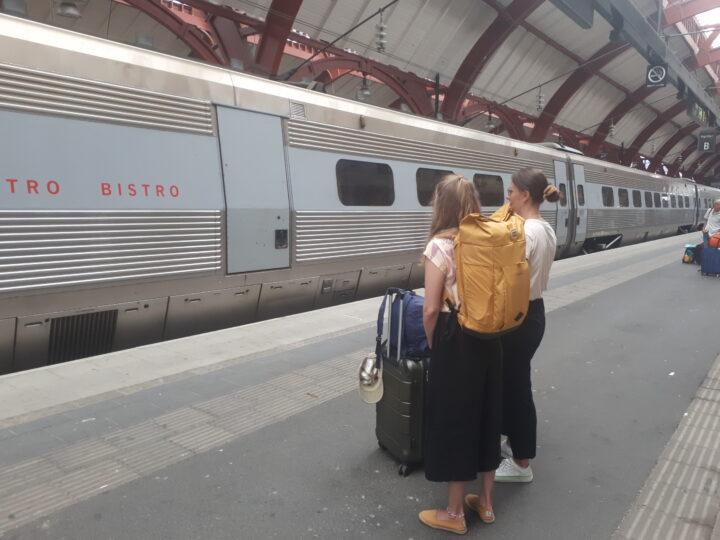Keeping it cool! – Pondering the ecological and social sustainability of traveling by land to an international conference
Johanna Jämsä, Salla Eilola and Nora Fagerholm Department of Geography and Geology, University of Turku
The 10th Nordic Geographers Meeting (NGM) titled Transitioning geographies, took place in Copenhagen on the 24th to 27th of June 2024. Part of our research group attended and traveled by land from Turku and Rovaniemi to Copenhagen. The conference put the spotlight on the widespread and rapid changes we are currently living through on our planet.
Sometimes we, even researchers who work on these topics everyday, have to be reminded of the realities of our collective emergency on the Earth. First keynote speaker Sebastian Mernild from the University of South Denmark, who is one of the lead scientists and co-authors of the latest Intergovernmental Panel on Climate Change (IPCC) reports, did just that. With his lecture “Climate Change and its extreme effects: IPCC Update – Selected Assessments and Regional Differences” he walked the conference crowd through the various changes happening on our planet’s climate with captivating insights. When his slide show of doom kept rolling in front of our eyes there was a collective relief that we had chosen to travel by land to Copenhagen. Even if the motivation to skip air travel had been, at least in part, a sense of adventure, the ecological significance of the choice was sharpened in our minds.

Figure 1. The keynote speech by Sebastian Mernild reminding the participants of the global climate targets and the current slow pace of action.
Traveling by land was pleasant, especially since a lot also depends on the company one travels with. We settled into a relaxing pace of travel with a night ferry to Stockholm and then train to Copenhagen. By traveling slowly, you could also orient yourself towards the destination. However, it became apparent to us that with trains you have to be prepared for delays and cancellations. You should thus build flexibility and buffer time into your travel plan.

Figure 2. Waiting to get on a train from Malmö to Stockholm. On our way back we faced two train cancellations but catched our connecting train nevertheless.
There is more and more talk about mobility choices, and many European universities already have policies encouraging land-based travel. Discussions with our NGM colleagues highlighted for example that some universities have introduced rules that prohibit flying to destinations that are within a specific kilometer threshold or urge additional payment for flight emissions.
In addition to ecological sustainability, thoughts on the social sustainability of this slower and often more unpredictable way of traveling came up during our conference travel experience. The reality is that conference days are often long and in themselves not only inspiring, but also tiring. Add to this the fatigue of long journeys and your endurance is tested. The discussion on sustainable travel should therefore include consideration of the different capacities to travel slowly that different bodies and life situations entail. Some of us are simply more able to endure the journey and manage unexpected delays and inconveniences.
Based on our experience, the collective effort put into managing all the practicalities during this slow travel reduces the stress and can make the travel less tiring. It is also fun to spend some more relaxed time with your colleagues! The shared motivation to make better mobility choices also brings a kind of winner’s feeling to traveling. In our research group we are more determined to make this choice the norm. Our choice got acknowledged also by a fellow Nordic NGM participant: “You’re so cool!”

Figure 3. Biking Copenhagen was a smooth and cool way to get from the hotel to the conference venue.
